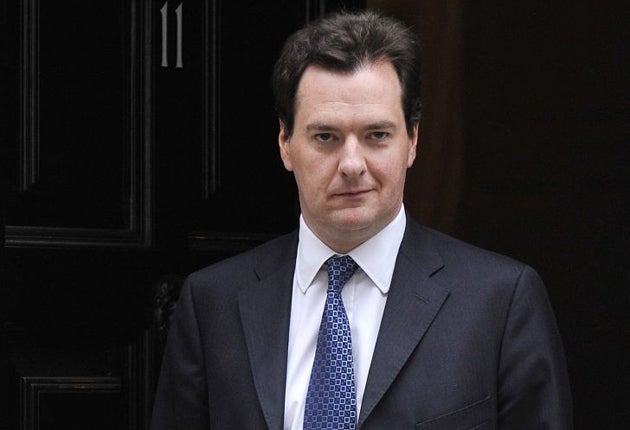Conservatives fear Chancellor will not meet deficit target

Growing numbers of senior Conservatives are concerned about the ability of the Chancellor to deliver the Coalition's pledge of eliminating Britain's structural deficit by 2015.
George Osborne yesterday conceded the economic recovery would be "longer and harder" than he hoped, amid renewed turmoil on global markets and fears over sovereign debt in the eurozone. Senior Tories are now privately expressing concerns that these factors will derail the Government's deficit-reduction plans and curtail the Chancellor's ability to go into the next election with a tax-cutting agenda for the middle classes.
"It is a bloody horrible mess and the way out of it is not clear," one told The Independent. "It was always going to be a big challenge to eliminate the deficit in one Parliament and now it seems impossible. People are concerned about the riots but the really important issue is the economic and financial crisis." Another said that although Mr Osborne had a "year's grace" in his deficit-reduction plans, they still presented a "huge challenge" given the current market uncertainties.
The concerns were echoed by the respected think tank the Institute for Fiscal Studies, which warned yesterday that the Office for Budget Responsibility (OBR) was likely to downgrade growth forecasts for the UK significantly in its next report in November.
"There is no doubt that the Chancellor is in a pretty nasty position," said Paul Johnson, the Institute's director. "If the OBR downgrades its growth forecasts by 1.5 per cent, he will have to decide whether to introduce even more draconian cuts or tax rises to meet his deficit-reduction targets, or whether to amend them. If he decides to amend them, he will then have to consider how the markets will react. That is a really hard place to be."
In the autumn, Mr Osborne will announce further plans to relax business regulations, employment law and planning bureaucracy in an attempt to kick-start the supply side of the economy. But his Treasury officials know his room for manoeuvre is limited.
Andrew Tyrie, the Conservative chairman of the Treasury Select Committee, said it was important to take a long view of the plan. "Just as one should not have been complacent about the chances of delivering the deficit-reduction programme a year ago, now we need to avoid panic because market conditions have become more volatile," he said. "[But] controlling spending is a remorseless challenge in normal times and these are certainly not normal times."
In a Commons statement yesterday, Mr Osborne said there was now a growing consensus among European governments that they needed to get "ahead of the curve" in tackling the problem of eurozone debt. "Individual countries must deal with their deficits, make their economies more competitive and strengthen their banking systems," he said. "But this can only ever be a bridge to a permanent solution. Eurozone countries need to accept the remorseless logic of monetary union that leads from a single currency to greater fiscal integration. Solutions such as euro bonds or other forms of guarantees now require serious consideration. And they must be matched by much more effective economic governance in the eurozone."
He added that although efforts to tackle the deficit had made the UK a "safe haven" for investors, it was not "immune" to the international "storm".
Subscribe to Independent Premium to bookmark this article
Want to bookmark your favourite articles and stories to read or reference later? Start your Independent Premium subscription today.

Join our commenting forum
Join thought-provoking conversations, follow other Independent readers and see their replies